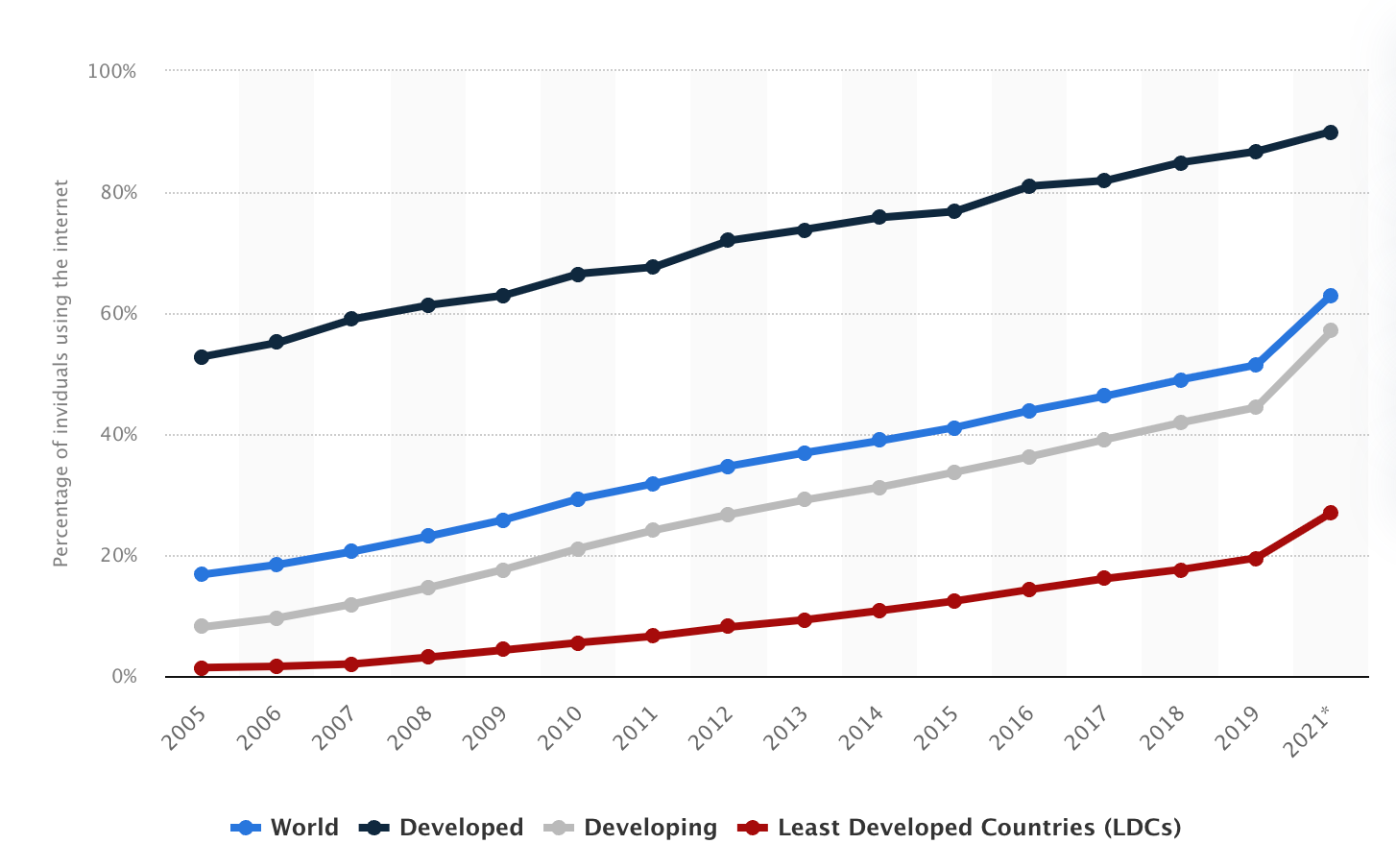Hey everyone - its longform season 👀
We will be dropping a fresh article on something related to NFTs, web3 and the like every Tuesday for the next few months at least. Please share and subscribe if you like it!
When generations imagine the future, they are often pretty far off. This is because they can only use their past and present as the basis for those predictions. For the purposes of this post, we will classify the future as a significant jump in technology. However, the word significant is completely subjective. To you, sitting there reading this text on a computer that is over 100,000x more powerful than that which sent us to the moon only 53 years ago, a jump from a sharpened stone to what would now resemble a knife would not be a significant jump in technology.
That technological jump would have been monumental to our now extinct biological cousin, Home Erectus. Homo Sapiens have existed with the same cognitive capacity for ~70,000 years. Homo Erectus walked the earth for ~2 million years, yet their technology remained stagnant, never evolving past various forms of sharpened stones. With no evolution in technology, did they ever even have a future?
For the last 60+ years, humanity’s future has been underscored by the the world of bits aka the digital realm. This digital realm has taken many names: the web, the net, cyberspace, and now The Metaverse.
What will our Metaverse future look like?
Pretty much everyone who builds and invests in web3 technology falls into the futurist bucket. Futurists naturally look at the future with exuberance and excitement. They were the early adopters of the internet, they were the early adopters of web2 apps, and they are early adopters of web3. Futurists are okay with jumping off the cliff into the abyss of the unknown. Thats why they are also usually entrepreneurs as well.
The end users of these technologies are, for the most part, not futurists.
This means that they look at the future with exuberance and excitement only if it appears to be both safely rooted in their current reality and an improvement upon that reality.
Why do people look at Tesla and Elon Musk with awe and not fear?
Tesla is:
✅ Rooted in their current reality - cars
✅ An improvement upon that reality - faster, sleeker, electric cars
To most people, The Metaverse is somewhere between a video game and a VR Mark Zuckerberg hell hole.
The metaverse is not:
❌ Rooted in their current reality - people dont spend their waking hours in an immersive VR environment
❌ An improvement over their current reality - The connection of the metaverse being an improvement on the internet is not clear.
A convergence of many trends, not one trend
The mental model that needs to be inserted within the cultural zeitgeist is that the metaverse is not one big scary “thing”; instead, it is a collection of independent trends that are all converging into one.
The most important of these trends are:
More people are getting internet access
Screentime is on the rise
Remote work + Covid
Technology is becoming more immersive
Gaming (penetration and investment)
Blockchain and NFTs allowing digital ownership
The world is online
Before we have a connected virtual world where people work, play, and foster relationships, we need an internet connection. Worldwide internet access sits at 63% up from 50% in 2019. 91.5% of North Americans have reliable access to internet (89.5% have reliable access to food).
Internet access is also on the rise in the developing world. From 2019 to 2021 internet access in developing countries increased 13% (44% to 57%). The world’s least developed countries (LDCs) saw a 7% jump in internet accessibility from 2019-2021 compared to their average year-over-year growth of ~1.5%.
Screens dominate our waking hours
Not only are more people getting access to the internet, these people are going online more times and for longer. 91% of US adults say they go online at least a day. 31% of those respondents admit to being online “almost constantly.” The average person spends 7 hours per day ( ~40% of their waking hours) in front of some kind of screen.
Remote work is here to stay
There’s this clinging narrative of a “return to normalcy” that many are hanging on to. The truth is that the world will never fully return to the way it was. Prior to Covid, it would have been strange to suggest meeting virtually, especially if that person was a commutable distance away. Now firms are closing $100M+ funds, and building unicorns without ever meeting a single investor or coworker in person. Covid showed everyone that most desk jobs can be done from home. Out of 2,050 full-time remote workers surveyed, 90% felt they were as or more productive at home as in the office. 25% of all professional jobs in North America will be remote by 2022.
Gaming is now mainstream
There are close to 3 billion gamers worldwide. These individuals are very comfortable fostering close connections with people they have never and most likely will never meet in-person. Over 50% of all US children aged 9-12 play Roblox at least once a week. Without knowing it, these children are being primed to work collaboratively and form friendships with people they’ve never met in person. They are also being trained to quickly and successfully interact within intricate digital economies. These digital economies could one day be worth more than the present day global economy.
The total virtual goods economy is estimated to be worth $30B and is predicted to grow to $190B by 2025.
Immersive technology is getting really good
Where in 2 million years, our friends, Homo Erectus, never made it passed sharpened rocks. Samuel Morse sent the first ever telegram message, “What hath God wrought?” in 1844 - just 178 years ago. We can now instantly communicate in an open, immersive virtual world with people living in every continent on earth.
Extended reality technologies - like virtual reality, augmented reality, and mixed reality have long captivated our collective imagination. The proliferation of this technology into a societal norm both scares and excites us. The extended reality industry is expected to grow from ~$45M to $330M by 2025. Around 20% of Facebook employees work in the company’s AR/VR division calle Facebook Reality Labs.
The big unlock
The big unlock for our collective Metaverse future comes from NFTs and blockchain technology. NFTs have become the base atomic unit for the metaverse. They enable true ownership in the digital world. They represent rights, they represent rule of law.
The Metaverse is the internet with ownership
Most of the value and property in the digital realm is owned by Google, Apple, Microsoft, Meta, Amazon & others. Countless hours spent on Facebook, Google, Reddit have gone to nothing and you receive no value for your interactions on those platforms, even though those companies receive financial value from your interactions.
The Metaverse is already here, but its communist.
But how many people jumped over the Berlin wall to get into the Soviet Union? How many people flee South Korea and head to North Korea?
Before NFTs, to platforms, we were merely renters. Ripe for value extraction.
With NFTs, we are owners. Existing on the same plain and with the same rights as the platforms themselves.
Without a Metaverse grounded in blockchain technology and true ownership, it will indeed become the big tech hell hole that we all fear.
We want to live in the Metaverse where we are free to control our own destiny and that starts with true ownership via NFTs.






Yo! I've read your mail for a while now and thus wanted to let ya know that we’re launching our NFT collection's community of the most active web3 contributors, motivated by one vision:
-push web3 education forward
We like to invite you to the society 🥷
We're forming a network of creators & builders for which we deliver a series of mini products, broader vision is to scale a web3 learning platform. DMs are open here or on Twitter :)
Great article.